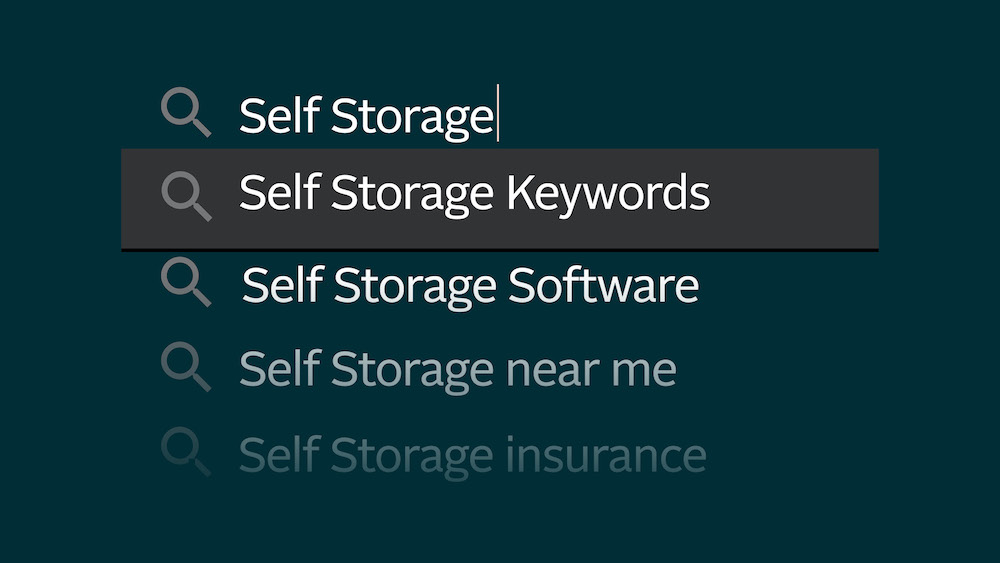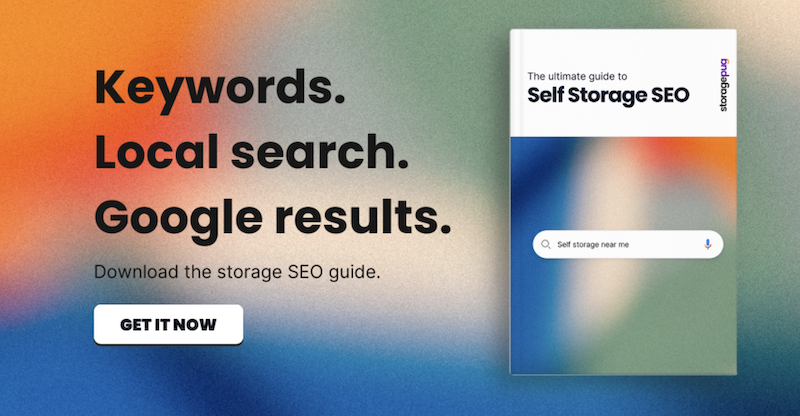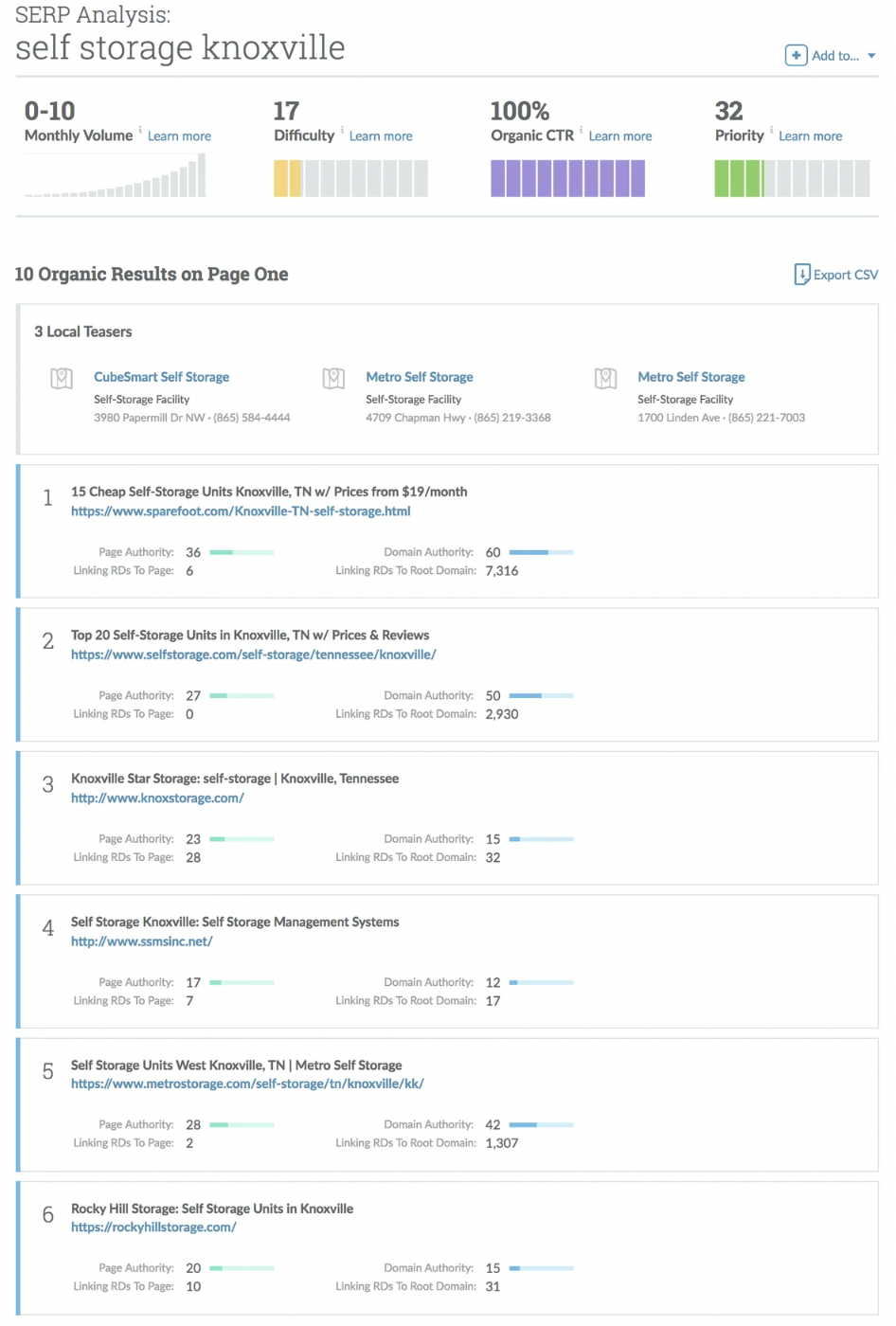
30 Jan 2024
Your website doesn’t do you any good if customers can’t find it.
But how do know what your target customer is searching in Google? When they’re looking for you, what do they type?
The words your customers use in search engines are the SEO keywords you need to capitalize on, and this blog will teach you how to find them!
Get self storage specific advice and strategy with StoragePug's Ultimate Guide to Self Storage SEO!
SEO is a key factor in your self storage marketing! If you aren't showing up for what your customers are searching for, you might as well not show up at all.
Picking the best keywords to drive rentals through your website comes down to two factors: traffic and competition.
Traffic is how many people are searching for the given term.
Competition is how strong the websites already ranking for the given term are.
Your most desirable keywords are high in traffic and low in competition.
To find out how much traffic and competition a given keyword has, you’ll need to use a tool like ahref’s keyword explorer or Moz's keyword explorer.
Both of these tools have free versions, which is all a small storage owner should need.
Next, you’ll need to guess what your customers might be searching. Start with simple phrases, like “self storage” or “self storage near [your area].” Then, add in variations.

You know your customers and your area. Try to include regional variations that your customers might use - this can give you an edge over the big REITs that are going to aim for the same keywords every time.
The keyword research tools will also suggest variants similar to what you’ve searched. This whole process is fairly quick, so you can afford to be thorough. Finding a keyword that no one else is chasing can net you a lot of rentals!
It’s tempting to go for the highest volume keywords. An example in this industry would be “storage”.
Getting ranked for “storage” would be awesome, but it’s also unrealistic.
Every storage business website in the world would be competing with yours.
But here’s a neat trick, you can use a service like BrightLocal to track search terms like "storage near me" from a specific location.
Local search results are by far the most important for a business like self storage. This is how most people find your website.
Local search results get more clicks than pay-per-click ads and organic search results. This adds a wrinkle when looking for high-traffic keywords - just because there’s a lot of competition for the keyword globally doesn’t mean you can’t rank for it locally!
Moz's Keyword Explorer lets you track the competition for a search term.

When planning your self storage SEO campaign, this tool is extremely useful.
The monthly volume is the estimated searches that happen each month.
The difficulty is how hard it would be to move on the first page for this keyword. The lower the better.
Priority is a combination of the Monthly Volume, Difficulty, and Organic CTR.
On the keyword explorer, anything below 30 is winnable for most businesses. However, a truly great keyword has a competition of 25 or lower.
Rand Fishkin, the founder of Moz has this to say about the difficulty, you can read more about it here.
If you're a very powerful, important site with loads of links and other strong ranking signals, chances are good you could more easily rank for higher KW Difficulty scoring keywords (even those in the 60s and 70s).
Conversely, if your site is brand new or has few positive ranking signals, you may find that even lower difficulty keywords (those in the 20s or 30s) are pretty tough.
If you can find a high volume keyword with this difficulty stat or lower, you are in business, write it down, write every keyword with this visage down.
Here’s where the fun part begins: getting ranked.
This part is not easy, which is often why a professional is required to help you out.
If you're searching for a self storage SEO professional we would love to chat!
StoragePug's services are proven to help storage facilities move up on Google and rent more units.
Get self storage specific advice and strategy with StoragePug's Ultimate Guide to Self Storage SEO!
Getting ranked for keywords involves a lot more than repeating the keyword in the right place. You do need to do that, though!
Start by putting the keyword in your meta title, on page header (H1), and meta description. Next, your site needs content! This can be explanatory paragraphs about your features, lists of amenities, or any other form of content.
Include the keywords naturally - which means talking about your self storage business.
Don’t overuse keywords, which is often called keyword stuffing. Google will punish websites that are clearly overusing their keywords because these sites aren’t good for users. Don't use the keyword more than feels natural - a few times in content, a few times in headers, and you're set!
The end goal is always to help your visitors.
Convincing Google that you’re the best website isn’t necessarily valuable unless that extra traffic ends up renting with you.
You’ll also have to tackle some technical SEO, including link building, submitting your sitemap, and work on any internal site errors (i.e. 404’s, duplicate content, JavaScript errors…).
SEO is not easy; even for pros results can take 3-6 months or longer.
The first place to start is by writing down all high-quality, low-competition keywords you find.
You should always have a direction/reference, but you will find that you will get ranked for keywords that you didn’t even write down.
Compare your list with the “Search Analytics” in Google Search Console to see what people are searching to find your site and add keywords to your list.

No matter what 3rd party app you use, these rankings aren't going to be 100% correct.
Google search console is the most accurate detector of rankings. It’s also free to use.
To use Google search console, you'll have to connect your website and set up profiles, but the biggest issue is that Google refuses to be specific. Instead of telling you how many searchers type each keyword, Google simply tells you whether it was between 10 and 100, 100 and 1,000, or 1,000 and 10,000.
These are big gaps! The keyword research tools use other methods of adding data to what Google gives us - the specifics aren't too important, but you should always use more than one keyword research tool to see how your customers are searching.
Again, regardless of what position stat you see, you should still manually check every quality keyword to see for yourself what’s working.
But continually search these terms on Google yourself to see where you show up!
SEO newcomers can get blinded by self storage keywords that aren't worth their time.
These can be:
There are a ton of high-volume keywords in the first group, but targeting them is a waste of time and energy. As a local business, your website is aimed at people who need to rent a storage unit - not people who want to bid on auctions online (they want a dedicated auction site with tons of options) or people learning to use an RV (they want informative RV-specific sites).
Even if you managed to capture those keywords for a little while, people won't be staying on your site because you're not who they're looking for. You'll drop off the rankings sooner or later, without seeing any extra rentals.
The second group is "keywords you won't capture." Typically those are keywords that are too broad, like "Self Storage Texas." Any result for that search is either going to be local, where Google gives them websites that offer storage nearby or will be to a website that spans the whole state. These will be REITs or other very large companies that small operators cannot hope to outmuscle.
We see operators worried about the third group of keywords most often. Lots of websites want to target things like "self storage in [zip code]" or "self storage near [neighborhood]."
StoragePug tested keywords like this, doing keyword research for the largest zip codes in the country. For zip codes with over a hundred thousand residents, the keyword volume for "self storage in [zip code]" didn't register. That doesn't mean that no one searches it - just that the number of searchers is so small that it might as well be zero.
Don't worry about including zip codes. Google knows where you are, and no one is using zip codes in self storage search terms (because Google knows where the searcher is, too).
Including local landmarks on your website can be beneficial, but not for SEO reasons. Landmarks can help site visitors understand where you are, but they aren't search keywords.
Finding keywords in the self storage industry doesn’t have to be hard.
You just need to know what tools to use and what to look for.
In this case, try Moz Keyword Explorer and Google Search Console.
Look for keywords with high volume and low competition.
If you’re totally new to self storage SEO, consider hiring a company that continually does SEO for the self storage industry.
Best of luck, take keyword research seriously - every SEO does.
If ever you get confused, ask us! We are happy to help!
Get in touch with us at StoragePug to learn more about our digital marketing services for self storage — or to schedule a demo.
StoragePug is a modern marketing company for self storage. We create intelligent marketing websites that allow you to rent units & take payments through your facilities' website.